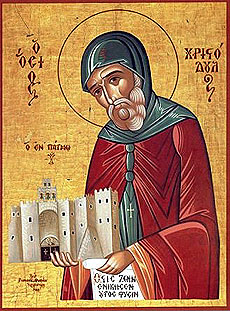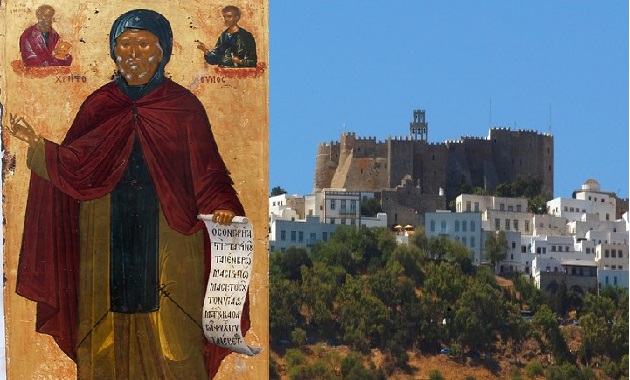Blessed Christodoulos of Patmos
21 October 2013Translation of the Relics of Blessed Christodoulos on Patmos (21 October)
The Blessed Christodoulos, or Ioannis as he was in the world [i.e. before he became a monk], was born in the year 1020 in Nicaea, Bithynia, of devout parents, Theodoros and Anna. From an early age he was brought up in a monastic environment and lived the ascetic life on Mount Olympus in Bithynia and in Palestine.
He later went to Mount Latron in Caria, Asia Minor, to the Monastery of Stilos, where he founded a library and gathered many monks around him. From his sojourn on Mount Latron, the Blessed Christodoulos is also called “Latrinos”. Because of barbarian incursions, however, he fled to Patmos, in 1079, where, with support from Emperor Alexios I Komninos (1081-1118), he built the famous monastery and library.
After this he went to Constantinople on monastery business and later still, when he had resigned as abbot, went to Strovlio, a town near the Asia Minor coast, where he undertook responsibility for the Monastery of Arseniou. From there, he later went to the island of Kos. There he founded the Monastery of the Pure Mother of God, to which, after representations on the part of Christodoulos, Emperor Alexios granted property on the islands of Leros and Leipsi.
 From Kos, he went to Constantinople and, having presented himself to Emperor Alexios, requested permission to found a monastery on the island of Patmos. Permission was granted and, besides, the whole island was given to Christodoulos, in 1088. Work on the construction of the monastery, which was dedicated to Saint John the Theologian, because it was on the island that he wrote the Revelation, was begun at once. But before it could be finished, Fr. Christodoulos and the other monks were forced to abandon both the work and the island, because of raids by the Turks.
From Kos, he went to Constantinople and, having presented himself to Emperor Alexios, requested permission to found a monastery on the island of Patmos. Permission was granted and, besides, the whole island was given to Christodoulos, in 1088. Work on the construction of the monastery, which was dedicated to Saint John the Theologian, because it was on the island that he wrote the Revelation, was begun at once. But before it could be finished, Fr. Christodoulos and the other monks were forced to abandon both the work and the island, because of raids by the Turks.
For safety reasons they sailed to Evripos (Evia) in the year 1092.
Research reveals that Christodoulos’ stay in Evia was short. There is some evidence that a rich, devout inhabitant of Evripos placed his well-appointed house at the monk’s disposal, and that he turned it into a monastery, even though the extensive properties of the monastery on Patmos commanded his presence in the world rather than the desert. Apart from this, there has long been a tradition in Evia that Blessed Christodoulos actually lived his ascetic life in a cave at the western edge of the small town of Limni.
During his stay on Evia, Christodoulos wrote his “Testament” and “Codicellus” (codicil) in March 1093, which was signed by seven official from the diocese of Evripos (Halkida).
Metropolitan Ioannis of Rhodes, in his work “Life and Works of our Blessed Father Christodoulos”, tells the story of the saint’s life and demise in Evripos, which occurred in 1093, as well as the recovery of his relics and their translation to Patmos. He writes: “The Saint and his brotherhood arrived there [Evia] at the spot where the sea waters flow outwards and then back, forming a strait, which the ancients named the Narrows of Evripos. He became the object of admiration of all there, and was accorded the honour befitting an angel in mortal form. He admonished his flock not to become disgruntled over the frequent moves, nor to resist, foolishly, the will of God, Who arranges everything in wisdom. But one of the monks, who was unable to bear the hardships, the stringency and punctiliousness of the virtuous life, imitated Judas of the Twelve Apostles and departed from the company of his brethren and replaced this spiritual assembly with an allotment which he rented.
And just as the devil entered Judas and urged him to betrayal, in the same way, the evil demon tormented the monk who had broken away from the brotherhood. When the father, who was gentle and forbearing, learned of the sickness of the recreant brother, he took the Gospel and went to the enraged and demented monk and read the words of the Holy Spirit concerning those who are sick. The brother’s condition improved immediately and he no longer wished to occupy his time with planting trees and watering his allotment, but declared himself ready to cultivate the ground of the virtues. In this way, he returned to the flock from which he had previously and wrongly cut himself off.
After a short time, [the Saint] prophesied to those with him that he would depart to the Lord; that the Sons of Hagar (Muslims) would not inhabit the islands for ever; and that his bosom friend [Alexios?] would not be indifferent towards them, but that, as soon as the tempest on the seas [piracy] had passed, they would return to their spiritual sheep-fold. He entreated them to take his dead body with them from this foreign land and lay it in the church which he had laboured so hard to build. After he had foretold this to his companions and had blessed those present with words of farewell, he gave up his spirit to God on 16 March. His prophecy was fulfilled and, with the elimination of piracy from the seas by imperial power, his disciples remembered what their virtuous shepherd had said and made ready to sail.
But when those living in that land heard that they were to be deprived of his honourable body, they gathered from round about and declared bluntly that they would not allow this to happen under any circumstances. For them it was unthinkable and entirely misguided that they should allow others to take the body wherever they wanted, since, for them, the saint was a saviour and a physician who cured all diseases. So they set a close watch over the dead man. But the prophecy of the departed saint could not prove false. So when the night was well spent, the brethren were able to escape the attention of the guards and, hoisting the dead man on their shoulders, embarked on a ship. The sea was calm, as it happened, and so they arrived at the island [Patmos] where they carried the body off the ship with great ceremony, singing hymns to God and making the air fragrant with perfumes. Today the body, which is intact and whole, lies in the church of the Apostle and is a source of miracles. Those who approach it with faith sense an aroma of myrrh and, by mere touch, are blessed and released from all bodily injury”.
Of the saint’s writings, the will and the codicil have survived.
The memory of the translation of the holy relics of Blessed Christodoulos is celebrated on 21 October.
Source: Bishop Agathangelos of Fanari, Συναξαριστής της Ορθοδόξου Εκκλησίας, March, pp. 164-8.







